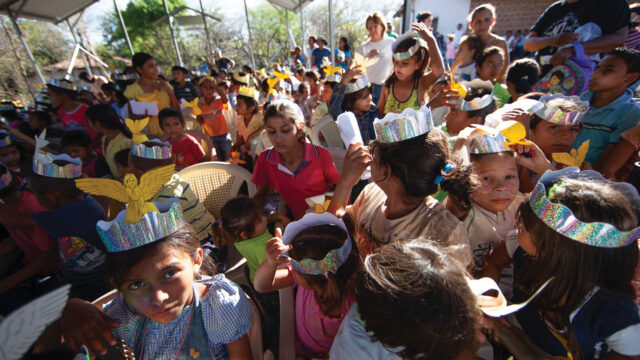How do we react when confronted with the power of God’s Word but caught in our selfish realities?

December 2001 marked a difficult period for people living in Argentina. On December 1 the country’s finance minister announced a freeze on all bank accounts. Nobody could draw any money from their account; credit and debit cards didn’t work. Cash was truly king—and if one had no cash at home, things soon became very complex. The freeze was to last only a couple days. Devaluation of the Argentinian peso initially meant the loss of about half of its buying power. Social unrest grew quickly. People who cannot buy food still need to eat. In many parts of the country supermarkets were looted.
We lived in Argentina in December 2001. The automated teller machine in our small university town didn’t spit out any cash either. We had little money at home—and nobody knew when the banks would open again. A sense of doom settled over the country during a time we usually sing “Silent Night” and give each other gifts. Our two daughters, age 4 and 2 respectively, didn’t worry too much about all of this. The summer weather was pleasant; there were no school (or university) classes, and Christmas was just around the corner.
My wife and I didn’t feel that calm. The university had offered credit for our small local supermarket, so we would not starve. We had a little bit of cash and decided to drive to the closest large town and shop at our regular supermarket for small gifts for our daughters. Stocks were very low. Even if one had cash, most shelves were empty. We finally settled on two plastic cups, two plastic plates, and two plastic cereal bowls—all color-coordinated—to give to our girls. Not exactly the stuff of dreams.
Christmas came quickly, and it was time to unwrap the gifts. In addition to the yellow and green plastic dishes, my wife, Chantal, had also sewn a cute apron for each girl. I will never forget the sheer joy in our daughters’ faces as they worked their way through the wrapping paper and finally saw their very own plastic dishes. With beaming faces they held their dishes and made sure they were on the table at the very next meal. Even today, 18 years later, we still have those dishes in our cupboard, slightly battered and well used. We dare not give them away. They tell a story of thankfulness and joy.
When We Don’t Feel Joy
For Ezra and Nehemiah, who lived in postexilic Jerusalem, times were tough too. Decades earlier God had brought His people back out of the Babylonian captivity—at least those who had been willing (Ezra 1; 2). What they encountered was disheartening. The city and its Temple lay in ruins. There was no city wall and no protection. Many of the surrounding people eyed the returnees with suspicion or open hatred.
Now, 80 years after the first group had returned and had rebuilt the Temple, things did not look much better. How can we trust God in the face of overwhelming challenges? How can we rejoice when we struggle to survive, and God seems absent? How can we move forward happily when He seems silent?
Israel’s problems were not just material. They needed a new wall to protect Jerusalem—and God responded to that need. But beyond broken walls, they needed God to fix their broken lives. We break when we ignore (actively or passively) God’s will for our lives. We break when we lose sight of the others around us who need His grace and keep focusing only on our own needs. Israel had ignored God’s will for their lives. Israel had trampled the rights of the weak and helpless. Selfishness and greed have a way of killing joy and hope.
The Remedy
That’s when Ezra and Nehemiah hatched a plan. Ezra, the scribe and priest, together with Nehemiah, the court-appointed governor, called a meeting (cf. Neh. 8). They built a wooden platform in an open square in front of the Water Gate. All people had been invited to listen to the one thing that helps us refocus and revive—God’s Word. This was no ordinary 11:00 worship service. From morning to midday leaders read from the Torah, the law of God. And since many had lost the ability to understand Hebrew, they enjoyed simultaneous translation, which carefully explained the meaning of the words (Neh. 8:7, 8).
How do we react when confronted with the power of God’s Word while caught in our selfish realities? Most people weep. We realize who we really are when we look into the mirror of God’s Word. Ezra and Nehemiah’s audience also wept as they listened attentively (verse 9). That’s when we hear Ezra make an astonishing statement: “Go your way, eat the fat, drink the sweet, and send portions to those for whom nothing is prepared; for this day is holy to our Lord. Do not sorrow, for the joy of the Lord is your strength” (verse 10).
This is not a text about health reform or healthful living. In a world of unrefined foodstuffs and often very limited food supplies, eating the fat and drinking the sweet was a way of saying: “Let’s celebrate God’s abundant provisions and blessings—and then let’s share these blessings with those around us.” It’s the last section of the verse that catches our attention. Do all these things, Ezra says, “for the joy of the Lord is your strength.”
Old Testament scholars have puzzled about this phrase. Does the joy of the Lord refer to Israel’s joy in their God, or does it point to something even more thrilling and exciting? Could it be that the biblical text points to the joy that the Lord experiences when He sees His people united in worship, and, finally, getting the big picture? Linguistically, both options are valid interpretations.*
Theologically, I resonate more with option two. Our strength is not self-produced joy—even if it means grasping complex theology. Our strength is anchored in God’s grace and His joy over our salvation and commitment. Jesus hints at that when He says that there is joy in heaven over even one sinner who repents (Luke 15:7). We can see that joy in the father in the parable of the prodigal son who comes running, embraces the lost son, and declares the celebration of a feast (verses 20-24).
Our two daughters don’t remember much of the Argentinian peso crash of 2001. But they do remember their plastic dishes. Their joy made our day. Our strength is anchored in His joy over us. What a marvelous God who enjoys giving grace to the ungrateful and restless!
* G. C. I. Wong, “Notes on ‘Joy’ in Nehemiah viii 10,” Vetus Testamentum 45.3 (1995): 383-386.








